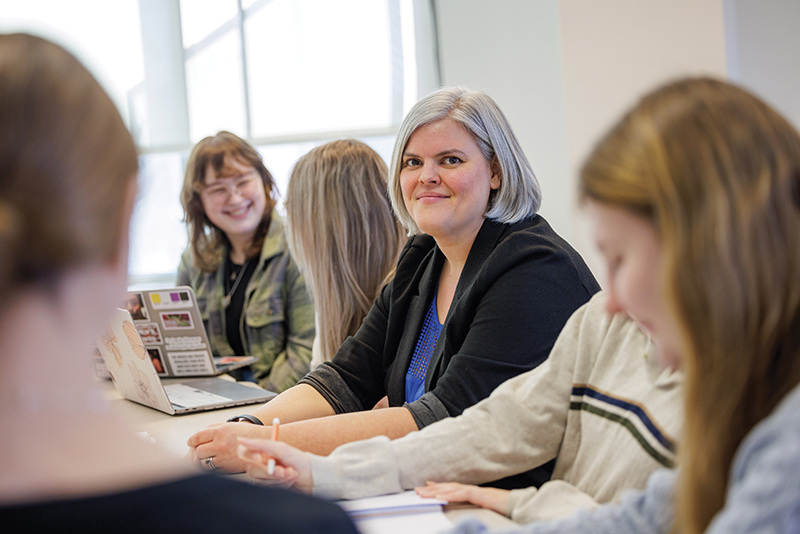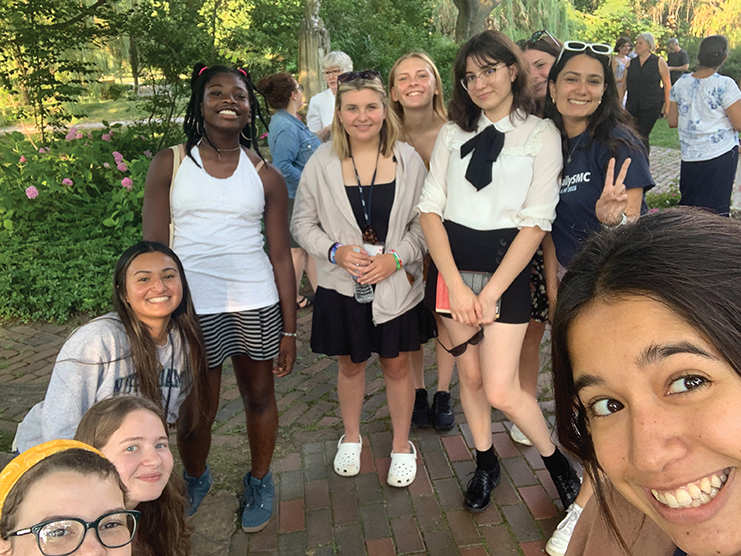Ask Yourself...Am I Open to Dialogue?
 by Haleigh Ehmsen '16
by Haleigh Ehmsen '16
What if no one is right, and no one is wrong? How can that be possible? When debate is the goal, there is a winner and a loser. With dialogue, the emphasis is on the conversation and how freely the participants can share opinions, listen thoughtfully, and be willing to learn. The Dialogue Project at Saint Mary’s is empowering students to have difficult conversations with respect and empathy. Megan Zwart, Ph.D., associate professor of philosophy at Saint Mary’s, is leading the project.
The need for The Dialogue Project grew apparent after the 2016 election when Zwart remembers talking with a student who shared how challenging it was to have conversations about the election because there were so many “big feelings.”
Recognizing the need for better tools to have dialogue, Zwart started dreaming up what it would look like to put a course together to teach students how to have respectful dialogue with each other. First offered in 2017, Dialogue and Civil Discourse is offered as a one-credit philosophy elective once a week in the evenings. During class, students practice challenging conversations and develop skills that empower them to discuss difficult subjects with care and openness.
Aligned with President Katie Conboy’s strategic vision to achieve a culture of human dignity and solidarity on campus, the project is a key part of bolstering a community of women who are ideologically diverse. As a midwestern Catholic women’s college, Saint Mary’s attracts, from all over the country and the world, students who hold a wide range of values and political beliefs.
The Dialogue Project—which now includes the course, a student leadership program and a summer institute for high school students—is centered around six virtues: attention, empathy, curiosity, intellectual humility, intellectual responsibility, and courage. In Zwart’s classroom, these virtues guide each weekly discussion on different topics including abortion, immigration, cancel culture, guns, and others.
Lori E. Johnson ’91, vice president for student enrollment and engagement, said The Dialogue Project is key to developing a strong campus community and preparing women for the world in which we live.
“I think there is a hunger among our students for meaning, connection, and community, and those things are more possible if there is an environment that values and supports good and open dialogue,” Johnson said. “The ability to really listen with empathy and for understanding along with the skill to speak and be heard are powerful tools for our students.”
Paige Madden ’23 took the course during her sophomore year. It was 2020, and as a double major in philosophy and humanistic studies, she wanted to be able to engage in challenging conversations that she seemed to be faced with constantly.
“It was a relief to be in a class where there was respectful dialogue,” Madden said. “We are all educated, kind women and wanted to treat each other with respect.”
Building a Community of Dialogue
While not all Saint Mary’s students will get the chance to take Zwart’s course, the project has expanded to offer campus programming that seeks to reach the broader campus community.
Zwart developed The Dialogue Project Student Leadership Program to continue building trust, dialogue, and a sense of belonging outside of the traditional classroom. Students can apply to be a Student Leadership Fellow, which includes a stipend and allows students to work together to meet the needs of the community.
Five student fellows work together to brainstorm ideas and host events on campus that encourage students to engage in dialogue rather than debate. With the overturning of Roe v. Wade, the fellows’ first event was to host a conversation on abortion led by students. Madden was a student fellow in the 2021-22 academic year and worked with her peers on it. She remembers that students were respectful of differing views in this forum and were able to engage in dialogue, rather than arguing or debating.
“Being involved with the program has taught me to listen to understand and listen with empathy,” Madden said. “Nobody is right or wrong. Opinions are subjective, and the program showed me how diverse our world is and how, at our core, there should be love and kindness regardless of what someone’s perspective is.”
Empowering Young Women Beyond Saint Mary’s
Saint Mary’s has a long history of educating women and girls, which is why in summer 2022, Zwart and colleagues piloted a six-day residential academic program designed for young women entering grades 10-12 called The Dialogue and Democracy Institute.
The new program quickly caught the attention of the Saint Mary’s community and beyond, filling up before they could advertise in South Bend schools. The program had a waitlist and ultimately, 27 participants gathered on campus last July to develop skills to be engaged citizens in their communities.

service as part of the Dialogue and Democracy
Institute summer pre-college program at Saint
Mary’s, led by Professor Megan Zwart.
The high school attendees met with local community leaders in South Bend and nearby Michigan. They heard from several faculty throughout the week. Molly Gower, professor of religious studies and theology led students in exercises to develop their ability to be attentive to others. Andrew Pierce, associate professor of philosophy and director of justice studies, introduced students to restorative justice. Rebekah Go, director of the Office for the Common Good, hosted a panel with elected local officials on both sides of the aisle.
Madden served as a student mentor at the summer institute and led a small group of students in reflection throughout the week. For her, one of the most impactful moments was visiting the Pokagon Band of Potawatomi Tribal Justice Center. The Pokagon Band once resided on the land that Saint Mary’s stands on today, and since moved to Dowagiac, Michigan.
“They have such a rich culture and so much history and tradition,” Madden said. “They welcomed us into their courtroom, which was created in a circular shape. It was such a good lesson in that we are all equals and trying to improve our community.”
As the week came to a close, the attendees developed their own action plan to address issues of concern in their communities.
Learning and Developing with the Times
Beyond campus, Zwart is recognized as a leader in teaching and facilitating dialogue. She has written op-eds for Inside Higher Ed and America magazines and published a case study of the Civil Discourse class in The Journal of Moral Theology. In fall 2022, she was selected as an ambassador for the Better Arguments Project, which is a national civic initiative hosted by the Aspen Institute, created to teach leaders how to have better conversations.
As part of the Better Arguments Project Seminar, Zwart attended class sessions with colleagues from across industries. The program has helped her to think differently about the student leadership program and continue to innovate and adapt.
“I want to be intentional about how to build more of these ideas into the student leadership program and how we teach students to embody the virtues through practice,” Zwart said. “If you shut down every time you see something that is different from you, you will never thrive. We want to build communities that value diversity.”
The Dialogue Project goes beyond teaching students to be civil with each other. It’s about learning to be self-aware and about acknowledging difference as a good thing, rather than a divisive element.
“When I started it was about teaching students how to have civil discourse,” Zwart said. “Now it’s beyond that, The Dialogue Project is about educating students to be participants in their community, to develop essential living skills that are key to being a good person.”
Creating a Culture of Intellectual Hospitality
Megan Zwart has led the elective Dialogue and Civil Discourse since 2017. The course is part of The Dialogue Project, a campus-wide initiative supporting a culture of trust, where dialogue across difference is possible and the community grows in the necessary skills to listen well, to ask good questions, and to speak up.
In an article published in The Journal of Moral Theology in January, Zwart writes about “intellectual hospitality,” an openness to new ideas and a readiness to move beyond a static position. If you’re in a conversation with the goal of educating or persuading another to agree with you, the exchange is more likely to be frustrating. If you enter into a conversation in the hope of realizing some measure of personal growth, you’ll have greater control over whether or not you succeed.
Here are the six key principles of dialogue:
1) Attention: Be attentive to yourself and others. Listen to understand rather than just waiting your turn to reply.
2) Empathy: Listen well. Good listening enables you to engage with another perspective.
3) Curiosity: Ask good questions, and think about your own responses. Curiosity opens people up to learn and take in new information; defensiveness shuts them off. Are you feeling defensive? What values of yours are being questioned? Turn defensiveness to curiosity.
4) Intellectual Humility: Reflect on what you know and don’t know about a particular topic.
5) Intellectual Responsibility: Take facts seriously. How much high-quality information do you have on this issue? Is it cited in more than one reliable source that includes editors and fact-checking?
6) Courage: Speak up when something matters to you.
Consider these aspects of a healthy dialogue the next time you’re faced with difference. Do you offer space for diverse ideas? How can you create a place at your table? There is room for all, no one is a winner or a loser.
